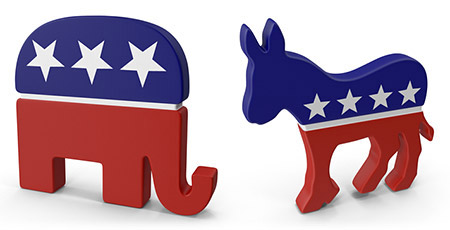Whether you’re in the Trump or Hillary camp—or for the possible candidate in between—some have been asking, ”Are there financial strategies to take to protect your investments before, during and after election day comes around?”

We understand that it’s fun to banter with your friends around the dinner table about the merits of this or that candidate, what’s even more interesting is to examine how investors react to political change. Behavioral researchers have found over the years that if an investor’s favored candidate becomes elected, the investor experiences an increased market confidence and tends to take on more portfolio risk. Conversely, if the candidate-of-choice loses, investors expect fallout from the new administration and look for investment safety.
Take the recent Brexit vote for example. Investors needed to be prepared for market risks if the vote went either way. Thankfully it didn’t create the significant market losses many predicted, but the impending vote had people on edge for a bit.
In the case of the U.S. presidency, researchers from the University of Miami, Brigham Young University and the University of Colorado at Denver conducted a study on how politics impacted investor behavior, reviewing three presidential-election years from 1991 through 2002.
Their behavioral research found that after the 1992 and 1996 elections when Bill Clinton won the presidency, Democratic voters tended to invest more in domestic stocks and to stay invested for a longer time. Conversely, Republicans felt less confident at that time about the economy and invested in foreign stocks and traded more frequently.
Then when George W. Bush won the presidential election in 2000, Republican voters did the same thing the Democrats did when their party representative was in office—they took on more risk, invested in domestic companies and traded less frequently.
The outcome from the researchers’ study was that both Republican and Democratic voters seemed to be influenced more by their political beliefs to help guide their investment choices than by listening to the logic and the advice of a financial advisor.
Voting—like investing—is a very personal act. And there’s no right or wrong way to cast your vote. The only thing that’s certain is it’s going to be quite a journey leading up to November.
The takeaway from studying investor behavior during election seasons is identical to why many investors fail to achieve reasonable returns…their own behavior is their most significant risk. We believe that investors who have a “true” diversified asset allocated portfolio will experience the variable returns from each asset class. Don’t be swayed by popular opinion or what you hear from the media about a certain candidate’s platform to make immediate portfolio changes.
Your financial situation is unique and needs an individual review to cover all potential scenarios. No matter what is happening in the world, a solid financial strategy should have the foundation of objective analysis. Whether you lean toward the Republican, Democratic, Independent—or any other political philosophy—our role is to help you create a solid financial plan.
investing politics us elections




